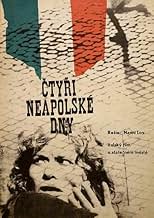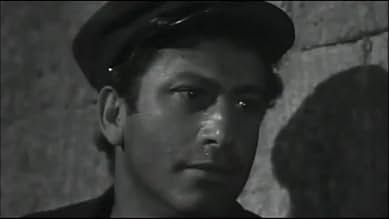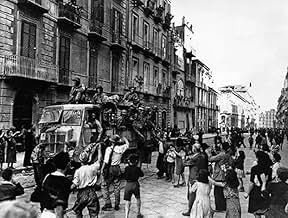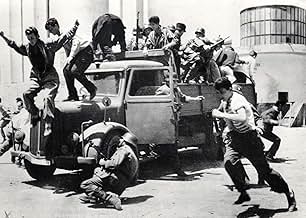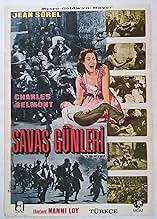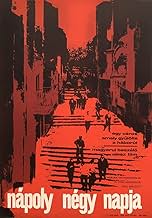PUNTUACIÓN EN IMDb
7,6/10
1,1 mil
TU PUNTUACIÓN
Un vistazo a la historia de la revuelta popular napolitana contra los invasores alemanes, durante la Segunda Guerra Mundial.Un vistazo a la historia de la revuelta popular napolitana contra los invasores alemanes, durante la Segunda Guerra Mundial.Un vistazo a la historia de la revuelta popular napolitana contra los invasores alemanes, durante la Segunda Guerra Mundial.
- Dirección
- Guión
- Reparto principal
- Nominado para 2 premios Óscar
- 9 premios y 9 nominaciones en total
Raffaele Barbato
- Giovanni Ajello
- (sin acreditar)
Charles Belmont
- Sailor
- (sin acreditar)
Regina Bianchi
- Concetta Capuozzo
- (sin acreditar)
Silvana Buzzanca
- Immacolata
- (sin acreditar)
Enzo Cannavale
- Partigiano
- (sin acreditar)
Luigi De Filippo
- Cicillo
- (sin acreditar)
Adriana Facchetti
- Scared Woman
- (sin acreditar)
Pasquale Fasciano
- Strongman
- (sin acreditar)
Domenico Formato
- Gennaro Capuozzo
- (sin acreditar)
Aldo Giuffrè
- Pitrella
- (sin acreditar)
Curt Lowens
- Sakau
- (sin acreditar)
Pupella Maggio
- Arturo's Mother
- (sin acreditar)
Rosalia Maggio
- Scared Woman
- (sin acreditar)
Alba Maiolini
- Grieving Woman
- (sin acreditar)
Lea Massari
- Maria
- (sin acreditar)
Reseñas destacadas
10gort-8
Can you find the main character? I can't.
Like many of you, I love movies. In every film that I've seen; sound and silent, short and feature length, narrative and documentary, a main character emerges. Sometimes, like in Fail-Safe and Dr. Strangelove, more than one emerges as part of a shifting focus, usually against the backdrop of a grand narrative. I've never seen a film, with the possible exception of very early cinema and raw news footage, where there is not even a pretense at a central character.
Instead, the city of Naples itself is the main character. With no disrespect meant to the men and women of Naples who faced the German Army, it's as though the city itself becomes a dog shaking off its deadly fleas.
Mall Megaplexes are jammed with the same few films, with different casts and titles perhaps, but stories told with a very limited scope. I encourage you to sample what great cinema looks like when told from a completely unique viewpoint.
Like many of you, I love movies. In every film that I've seen; sound and silent, short and feature length, narrative and documentary, a main character emerges. Sometimes, like in Fail-Safe and Dr. Strangelove, more than one emerges as part of a shifting focus, usually against the backdrop of a grand narrative. I've never seen a film, with the possible exception of very early cinema and raw news footage, where there is not even a pretense at a central character.
Instead, the city of Naples itself is the main character. With no disrespect meant to the men and women of Naples who faced the German Army, it's as though the city itself becomes a dog shaking off its deadly fleas.
Mall Megaplexes are jammed with the same few films, with different casts and titles perhaps, but stories told with a very limited scope. I encourage you to sample what great cinema looks like when told from a completely unique viewpoint.
Every time I watch this movie I'm deeply moved by the many true to life characters you see depicted on the backdrop scenario of the struggle Napoli's citizens suffered to get rid of the Nazis' invasion and occupation.
Many of the characters are not fictitious: the child Gennaro Capuozzo was awarded the Gold Medal for Military Valor.
The cast is exceptional with many great actors and the minor ones act in a perfect way too. Even with the technical limitations of this movie, I find it engrossing and very close to the world famous Italian neorealism masterpieces such as Paisà and Roma Città Aperta.
I highly recommend it.
Many of the characters are not fictitious: the child Gennaro Capuozzo was awarded the Gold Medal for Military Valor.
The cast is exceptional with many great actors and the minor ones act in a perfect way too. Even with the technical limitations of this movie, I find it engrossing and very close to the world famous Italian neorealism masterpieces such as Paisà and Roma Città Aperta.
I highly recommend it.
"The Four Days of Naples" is an interesting film in that although it was made in 1962, it looks like it was made just after the war. That's because many buildings show bomb damage. Could they have sat that way since the war or did they blow up a few buildings to add to the realism? I don't know, but the film sure got the look right.
The film is set in 1943. The Allies have invaded Sicily and are on the move northward. In nearby Naples, word arrives that the Italian army has surrendered--and the residents are thrilled as it looks like the war is over for them. However, the Germans go immediately from allies to enslavers and they begin committing atrocities on the Italians. Soon, the Neopolitans realize that unless they fight back, they will die--thus begins four days of bloody fighting between mostly civilians and the German army throughout the streets of the town.
Because this was a battle to save he city, it's made up of lots and lots of separate vignettes all strung together. Some are very compelling--such as the boys of the reform school leaving to join in the fight--even though many look to be only about 10 or even younger. Others are more bizarre as there are TONS of women running about screaming and getting in the way of the fighting. About the only thing that did not ring true in these stories was when they showed a couple people pulling the pins out of grenades with their teeth---something that only occurs in movies and never in real life (you'd lose your teeth doing this).
This film works very well. Of course, much of this is because it was well-directed, but I also loved the neo-realistic style (though most films in this style were made a decade or more earlier)--with non-actors playing the parts of the citizens. While the film could have been like an American epic (such as "The Longest Day")--star-studded throughout, instead the real folks made it all come alive--like we are really watching the battles unfold. Realism--realistic looking deaths, heroism, occasional cowardice--realism from start to finish.
By the way, although it's a very good film, I would really love to see it re-captioned. That's because like many films captioned many years ago, the people doing this didn't feel a need to caption everything the people said or caption it word for word. I dislike this intensely--as would most film purists. I've seen much worse captioning--but also much, much better.
By the way, you can't blame the film makers, but the tanks used in the film were modern tanks like American-built Walker Bulldogs--not vintage German tanks. There just aren't that many Panzer tanks left and they certainly weren't going to risk the few possibly still available making a film.
The film is set in 1943. The Allies have invaded Sicily and are on the move northward. In nearby Naples, word arrives that the Italian army has surrendered--and the residents are thrilled as it looks like the war is over for them. However, the Germans go immediately from allies to enslavers and they begin committing atrocities on the Italians. Soon, the Neopolitans realize that unless they fight back, they will die--thus begins four days of bloody fighting between mostly civilians and the German army throughout the streets of the town.
Because this was a battle to save he city, it's made up of lots and lots of separate vignettes all strung together. Some are very compelling--such as the boys of the reform school leaving to join in the fight--even though many look to be only about 10 or even younger. Others are more bizarre as there are TONS of women running about screaming and getting in the way of the fighting. About the only thing that did not ring true in these stories was when they showed a couple people pulling the pins out of grenades with their teeth---something that only occurs in movies and never in real life (you'd lose your teeth doing this).
This film works very well. Of course, much of this is because it was well-directed, but I also loved the neo-realistic style (though most films in this style were made a decade or more earlier)--with non-actors playing the parts of the citizens. While the film could have been like an American epic (such as "The Longest Day")--star-studded throughout, instead the real folks made it all come alive--like we are really watching the battles unfold. Realism--realistic looking deaths, heroism, occasional cowardice--realism from start to finish.
By the way, although it's a very good film, I would really love to see it re-captioned. That's because like many films captioned many years ago, the people doing this didn't feel a need to caption everything the people said or caption it word for word. I dislike this intensely--as would most film purists. I've seen much worse captioning--but also much, much better.
By the way, you can't blame the film makers, but the tanks used in the film were modern tanks like American-built Walker Bulldogs--not vintage German tanks. There just aren't that many Panzer tanks left and they certainly weren't going to risk the few possibly still available making a film.
A cast of virtual then-unknowns re-enacts the German takeover of Naples following the Italian Army's surrender to the Allies, and the peasant uprising which ensued. "The Four Days of Naples" was released in 1962 and is shown occasionally on Turner Classic Movies, in Italian with English subtitles.
What's most interesting about this film is that director Loy follows many characters and subplots, and often fails to resolve them because they become lost in the chaos of the house-to-house battle within the city. Frank Wolff ("Desert Assault") is Salvatore, who loves Maria (Lea Massari) even though she has married a rich man. The two wind up fighting along side one another; Gian Maria Volonte is the Captain who helps organize a partisan resistance; Aldo Giuffre (The Good, the Bad and the Ugly) is one member of an Italian artillery unit which becomes embroiled in the siege; and Enzo Turco ("Anzio") is a Black-shirt who is taken prisoner despite his Fascist convictions. Every member of the ensemble cast is passionate and utterly convincing. Many were virtually unknown at the time of production, and became big stars in Italy within the next few years.
Director Loy shoots his film with a documentary style. Some shots are well-crafted, though, and give the audience a new perspective on the action. One long pan from a rooftop from which partisans are firing on the Germans shows how the men move from street to street without any cutting at all. The black-and-white cinematography is utterly fantastic. Close-ups of faces deliver all of the drama that dialog simply cannot convey.
The film brings the viewer inside what occupation and resistance do the civilian population of a city. At one point, the Germans drive the citizens out of one quarter so that they can occupy it, forcing people to move in with strangers on the other side of the city. Later, they attempt to conscript Italian men into their labor force, which is what sparks the uprising. The camera follows us into individual homes and family situations, which are ripped apart by the affects of war. He then takes us to massive crowds as they riot in the streets. The scope of battle is excellently captured, as are the cramped alleys and rooms from which the citizens must fight.
There a number of standout vignettes: the Neapolitans throwing furniture from their windows atop the heads of Nazi soldiers in a narrow alleyway; one sequence in which a number of teens escape a reform school to join the fight; a prisoner-negotiation scene in which things go unexpectedly and several Italian civilians are caught in a crossfire; the scene in which the Italian men are taken in trucks to be conscripted, only to have their wives overwhelm the German guards. All of these scenes convey a spirit of freedom, aided by Carlo Rustichelli's rousing score.
"The Four Days of Naples" is a well-crafted drama, intended to be taken seriously, unlike many Italian war films which would follow a few years later. This is an inspiring drama of courage and determination, definitely a must-see for any fan of war films or the Italian cinema.
What's most interesting about this film is that director Loy follows many characters and subplots, and often fails to resolve them because they become lost in the chaos of the house-to-house battle within the city. Frank Wolff ("Desert Assault") is Salvatore, who loves Maria (Lea Massari) even though she has married a rich man. The two wind up fighting along side one another; Gian Maria Volonte is the Captain who helps organize a partisan resistance; Aldo Giuffre (The Good, the Bad and the Ugly) is one member of an Italian artillery unit which becomes embroiled in the siege; and Enzo Turco ("Anzio") is a Black-shirt who is taken prisoner despite his Fascist convictions. Every member of the ensemble cast is passionate and utterly convincing. Many were virtually unknown at the time of production, and became big stars in Italy within the next few years.
Director Loy shoots his film with a documentary style. Some shots are well-crafted, though, and give the audience a new perspective on the action. One long pan from a rooftop from which partisans are firing on the Germans shows how the men move from street to street without any cutting at all. The black-and-white cinematography is utterly fantastic. Close-ups of faces deliver all of the drama that dialog simply cannot convey.
The film brings the viewer inside what occupation and resistance do the civilian population of a city. At one point, the Germans drive the citizens out of one quarter so that they can occupy it, forcing people to move in with strangers on the other side of the city. Later, they attempt to conscript Italian men into their labor force, which is what sparks the uprising. The camera follows us into individual homes and family situations, which are ripped apart by the affects of war. He then takes us to massive crowds as they riot in the streets. The scope of battle is excellently captured, as are the cramped alleys and rooms from which the citizens must fight.
There a number of standout vignettes: the Neapolitans throwing furniture from their windows atop the heads of Nazi soldiers in a narrow alleyway; one sequence in which a number of teens escape a reform school to join the fight; a prisoner-negotiation scene in which things go unexpectedly and several Italian civilians are caught in a crossfire; the scene in which the Italian men are taken in trucks to be conscripted, only to have their wives overwhelm the German guards. All of these scenes convey a spirit of freedom, aided by Carlo Rustichelli's rousing score.
"The Four Days of Naples" is a well-crafted drama, intended to be taken seriously, unlike many Italian war films which would follow a few years later. This is an inspiring drama of courage and determination, definitely a must-see for any fan of war films or the Italian cinema.
10sissoed
I just saw this 1962 film on Turner Classic Movies and promptly tracked down and ordered a VHS of it. A very realistic film with many characters whose stories start and in most cases are left unresolved in the midst of the fighting. The screenplay was original for the screen, not based on any book, and received a 1963 Oscar nomination in the original screenplay category. There is a 1979 book with the same title, also telling of the uprising, that is NOT the source of this film. According to summaries, the book says that the Naples "street boys" instigated and led the rebellion. Not in this film, however, which focuses on adults and has many wrenching scenes of mothers and children, husbands and wives torn apart. The ensemble cast is passionate and convincing. Unlike the other commenter who said the film is an argument against war, this is really an argument for standing up and fighting against those who would treat you as slaves (which the NAZIs did and which led to the uprising). Great film!
¿Sabías que...?
- CuriosidadesAll actors accepted to be uncredited in honor of the civilians who died during the uprising and remained without official recognition.
- PifiasAt the beginning of the scene in which Allejo and his gang of kids are having a shootout from the mountain train and Cazzillo gets shot, around 1h 31min, a piece of glass in front of him reflects the crew.
- Créditos adicionalesWhen the MGM lion roars, no sound comes out of its mouth.
- ConexionesEdited into Film socialisme (2010)
Selecciones populares
Inicia sesión para calificar y añadir a tu lista para recibir recomendaciones personalizadas
- How long is The Four Days of Naples?Con tecnología de Alexa
Detalles
Taquilla
- Presupuesto
- 800.000 US$ (estimación)
- Duración
- 2h(120 min)
- Color
- Mezcla de sonido
- Relación de aspecto
- 1.66 : 1
Contribuir a esta página
Sugerir un cambio o añadir el contenido que falta

